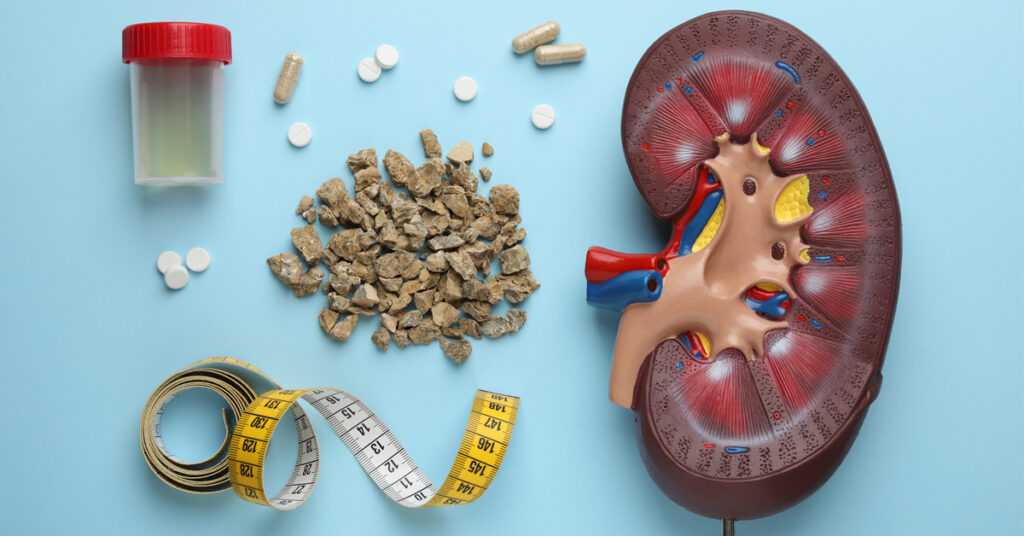Kidney stones are a common health problem that affects millions of people each year. Kidney stones occur when certain substances, such as calcium, oxalate, and uric acid, become concentrated in the urine. When these substances crystalize and stick together they create a kidney stone.
In some cases, the stones can be small and pass out of the body without causing any symptoms. However, larger stones can become lodged in the urinary tract and cause pain and other symptoms.
What Causes Kidney Stones?
The exact cause of kidney stones is unknown, but several factors can increase your risk of developing stones, such as dehydration, certain medications, and a diet high in salt, animal protein, and sugar. People who have had kidney stones in the past are more likely to develop them again.
What Are The Symptoms?
Symptoms of kidney stones include:
- Pain in the lower back or side
- Nausea
- Vomiting
- Blood in the urine
If the stone becomes lodged in the urinary tract, it can cause pain in the groin and genital area.
How Are Kidney Stones Treated?
Treatment for kidney stones depends on the size and location of the stone. Small stones may pass out of the body on their own, while larger stones may require surgery to remove them. Some medications may be prescribed to help break up the stones.
How To Prevent Kidney Stones
While experiencing kidney stones may be unavoidable for some people, there are may techniques and lifestyle choices you can implement to lower your risk of developing a kidney stone. Here are 10 ways to help prevent the formation of kidney stones.
1. Drink Plenty of Fluids
Drinking plenty of fluids is one of the best ways to prevent kidney stones. Aim for at least eight glasses of water per day. Other fluids such as fruit juices, herbal teas, and vegetable juices are also beneficial.
2. Avoid High-Calcium Foods
High levels of calcium in the urine can lead to the formation of kidney stones. Avoid high-calcium foods such as dairy products, nuts, and spinach.
3. Increase Your Intake of Citric Acid
Citric acid helps to break down calcium and other minerals in the urine that can contribute to the formation of kidney stones. Increase your citric acid intake by eating more citrus fruits, such as oranges, lemons, and grapefruits.
4. Increase Your Intake of Magnesium
Magnesium helps reduce the amount of calcium in the urine. Increase your intake of magnesium-rich foods such as legumes, nuts, and green leafy vegetables.
5. Avoid High-Oxalate Foods
High levels of oxalate in the urine can lead to the formation of kidney stones. Avoid high-oxalate foods such as chocolate, peanuts, and rhubarb.
6. Increase Your Intake of Vitamin B6
Vitamin B6 helps reduce the amount of oxalate in the urine. Increase your intake of vitamin B6 by eating more poultry, fish, and leafy green vegetables.
7. Limit Your Intake of Animal Proteins
Eating too much animal protein can contribute to the formation of kidney stones. Limit your intake of red meat, eggs, and dairy products.
8. Increase Your Intake of Vitamin C
Vitamin C helps reduce the amount of calcium in the urine. Increase your intake of vitamin C by eating more citrus fruits and vegetables.
9. Reduce Your Sodium Intake
High levels of sodium in the urine can lead to the formation of kidney stones. Reduce your intake of processed foods and salty snacks.
10. Exercise Regularly
Regular exercise reduces the amount of calcium in the urine, which can help prevent kidney stone formation. Aim for at least 30 minutes of exercise per day.
Take the Next Step With Your Kidney Stone Prevention
Kidney stones can be a painful and uncomfortable experience, but with the proper treatment and lifestyle changes, they can be managed. If you think you may be at risk for kidney stones, talk to your doctor about ways to prevent them.
Treat kidney stones before they become a problem – call 843-347-2450 to schedule an appointment today!

